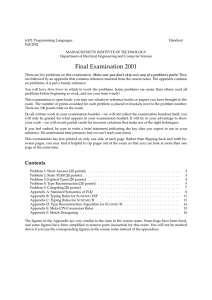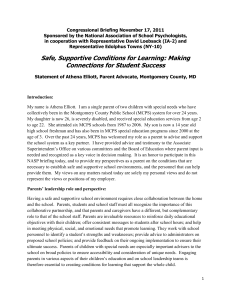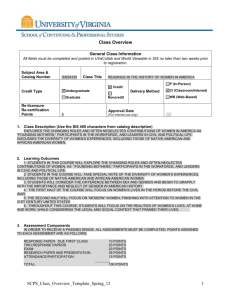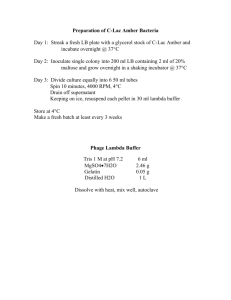6.821 Programming Languages Handout Fall 2002
advertisement
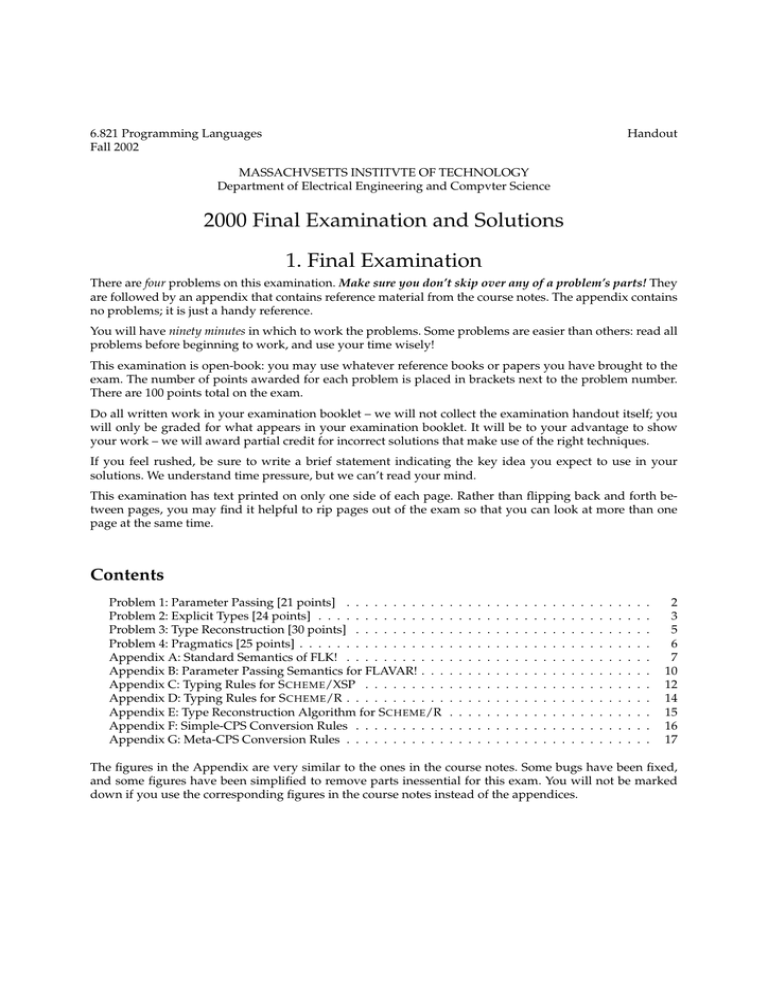
6.821 Programming Languages
Fall 2002
Handout
MASSACHVSETTS INSTITVTE OF TECHNOLOGY
Department of Electrical Engineering and Compvter Science
2000 Final Examination and Solutions
1. Final Examination
There are four problems on this examination. Make sure you don’t skip over any of a problem’s parts! They
are followed by an appendix that contains reference material from the course notes. The appendix contains
no problems; it is just a handy reference.
You will have ninety minutes in which to work the problems. Some problems are easier than others: read all
problems before beginning to work, and use your time wisely!
This examination is open-book: you may use whatever reference books or papers you have brought to the
exam. The number of points awarded for each problem is placed in brackets next to the problem number.
There are 100 points total on the exam.
Do all written work in your examination booklet – we will not collect the examination handout itself; you
will only be graded for what appears in your examination booklet. It will be to your advantage to show
your work – we will award partial credit for incorrect solutions that make use of the right techniques.
If you feel rushed, be sure to write a brief statement indicating the key idea you expect to use in your
solutions. We understand time pressure, but we can’t read your mind.
This examination has text printed on only one side of each page. Rather than flipping back and forth between pages, you may find it helpful to rip pages out of the exam so that you can look at more than one
page at the same time.
Contents
Problem 1: Parameter Passing [21 points] . . . . . . . . . . .
Problem 2: Explicit Types [24 points] . . . . . . . . . . . . . .
Problem 3: Type Reconstruction [30 points] . . . . . . . . . .
Problem 4: Pragmatics [25 points] . . . . . . . . . . . . . . . .
Appendix A: Standard Semantics of FLK! . . . . . . . . . . .
Appendix B: Parameter Passing Semantics for FLAVAR! . . .
Appendix C: Typing Rules for S CHEME/XSP . . . . . . . . .
Appendix D: Typing Rules for S CHEME/R . . . . . . . . . . .
Appendix E: Type Reconstruction Algorithm for S CHEME/R
Appendix F: Simple-CPS Conversion Rules . . . . . . . . . .
Appendix G: Meta-CPS Conversion Rules . . . . . . . . . . .
.
.
.
.
.
.
.
.
.
.
.
.
.
.
.
.
.
.
.
.
.
.
.
.
.
.
.
.
.
.
.
.
.
.
.
.
.
.
.
.
.
.
.
.
.
.
.
.
.
.
.
.
.
.
.
.
.
.
.
.
.
.
.
.
.
.
.
.
.
.
.
.
.
.
.
.
.
.
.
.
.
.
.
.
.
.
.
.
.
.
.
.
.
.
.
.
.
.
.
.
.
.
.
.
.
.
.
.
.
.
.
.
.
.
.
.
.
.
.
.
.
.
.
.
.
.
.
.
.
.
.
.
.
.
.
.
.
.
.
.
.
.
.
.
.
.
.
.
.
.
.
.
.
.
.
.
.
.
.
.
.
.
.
.
.
.
.
.
.
.
.
.
.
.
.
.
.
.
.
.
.
.
.
.
.
.
.
.
.
.
.
.
.
.
.
.
.
.
.
.
.
.
.
.
.
.
.
.
.
.
.
.
.
.
.
.
.
.
.
.
.
.
.
.
.
.
.
.
.
.
.
.
.
.
.
.
.
.
.
.
.
.
2
3
5
6
7
10
12
14
15
16
17
The figures in the Appendix are very similar to the ones in the course notes. Some bugs have been fixed,
and some figures have been simplified to remove parts inessential for this exam. You will not be marked
down if you use the corresponding figures in the course notes instead of the appendices.
Problem 1: Parameter Passing [21 points]
Give the meaning of the following FLAVAR! expression under each parameter passing scheme. Hint: try to
figure out the values of (begin (f a) a) and (f (begin (set! b (+ b 2)) b)) separately, then find the
sum.
(let ((a 4) (b 0))
(let ((f (lambda (x)
(begin (set! x (* x x))
(/ x 2)))))
(+ (begin (f a) a)
(f (begin (set! b (+ b 2)) b)))))
a. [7 points] call-by-value
b. [7 points] call-by-name
c. [7 points] call-by-reference
2
Problem 2: Explicit Types [24 points]
ANSWERS FOR THE FOLLOWING QUESTIONS SHOULD BE BASED ON THE SCHEME/XSP TYPING
RULES GIVEN IN APPENDIX C.
Louis Reasoner likes both dynamic scoping and explicit types, and thus decides to create a new language,
Scheme/DX, that includes both! However, certain problems arise and you are called into rescue Louis’ attempt.
Louis revised a procedure definition to be:
Tm
))) EB )
E := . . . | (lambda (((I1 T1 ) . . . (In Tn )) ((I1 T1 ) . . . (Im
with the new type:
Tm
))) TB )
T := . . . | (-> ((T1 . . . Tn ) ((I1 T1 ) . . . (Im
The first list of identifiers {Ii } and types {Ti } in LAMBDA specifies the formal parameters to LAMBDA,
and the second list of identifiers {Ii } and types {Ti } specifies all of the dynamically bound identifiers used
by E and their types. Thus when a procedure is called, the types of BOTH the actual parameters and the
dynamically bound variables must match.
For example:
(let ((x 1))
(let ((p (lambda (((y int)) ((x bool))) (if x y 0))))
(let ((x #t))
(p 1))))
⇒ 1
(let ((x #t))
(let ((p (lambda (((y int)) ((x bool))) (if x y 0))))
(let ((x 1))
(p 1))))
⇒ NOT WELL TYPED
For an expression E, let S be the set of dynamically bound identifiers in E. We can extend our typing framework to be
A E :T@S
In this framework, “@” means “E uses dynamic variables” just like “:” means “has type”.
Our new combined typing and dynamic variable rule for identifiers is:
A[I : T] I : T @ {I}
Here are two examples to give you an idea of what we mean:
A[x : int] (+ 1 x) : int @ {x}
A[x : int] (let ((x 1)) (+ 1 x)) : int @ {}
In this framework:
3
a. [6 points] Give a combined typing and dynamic variable rule for LET.
b. [6 points] Give a combined typing and dynamic variable rule for LAMBDA.
c. [6 points] Give a combined typing and dynamic variable rule for application.
d. [6 points] Briefly argue that your rules always guarantee that in well-typed programs references to
dynamic variables are bound.
4
Problem 3: Type Reconstruction [30 points]
ANSWERS FOR THE FOLLOWING QUESTIONS SHOULD BE BASED ON THE SCHEME/R TYPING
RULES AND TYPE RECONSTRUCTION ALGORITHM GIVEN IN THE APPENDIX.
Ben Bitdiddle is at it again, further enhancing Scheme/R. In this new and improved version he has added
a new construct called go that executes all of its constituent expressions E1...En in parallel:
E := . . . | (go (I1 . . . In ) E1 . . . Em ) | (talk! I E) | (listen I)
go terminates when all of E1 . . . Em terminate, and it returns the value of E1 . go includes the ability to use
communication variables I1 . . . In in a parallel computation. A communication variable can be assigned
a value by talk!. An expression in go can wait for a communication variable to be given a value with
listen. listen returns the value of the variable once it is set with talk!. For a program to be well typed,
all E1 . . . En in go must be well typed.
Communication variables will have the unique type (commof T) where T is the type of value they hold.
This will ensure that only communication variables can be used with talk! and listen, and that communication variables can not be used in any other expression.
Ben has given you the Scheme/R typing rules for talk! and listen:
AE:T
A I : (commof T)
A (talk! I E) : unit
[talk!]
A I : (commof T)
A (listen I) : T
[listen]
a. [8 points] Give the Scheme/R typing rule for go.
b. [7 points] Give the Scheme/R reconstruction algorithm for talk!.
c. [7 points] Give the Scheme/R reconstruction algorithm for listen.
d. [8 points] Give the Scheme/R reconstruction algorithm for go.
5
Problem 4: Pragmatics [25 points]
ANSWERS FOR THE FOLLOWING QUESTIONS SHOULD BE BASED ON THE META CPS CONVERSION ALGORITHM GIVEN IN APPENDIX G.
This problem contains two independent parts:
a. Ben Bitdiddle, the engineer in charge of the MCPS phase in the Tortoise compiler, looked over the
book and the previous years’ finals and couldn’t find the meta-cps rule for label and jump. As Ben is
very rushed – the new Tortoise compiler should hit the market in the middle of the holiday season –
he’s asking for your help.
Here is a quick reminder of the semantics of label and jump:
(label I E) evaluates E; inside E, I is bound to the continuation of (label I E). The labels are statically
scoped (as the normal Scheme variables are).
(jump E1 E2 ) calls the continuation resulted from evaluating E1 , passing to it the result of evaluating
E2 . E1 should evaluate to a label (i.e. a continuation introduced by label). The behavior of (jump
E1 E2 ) is unspecified if E1 doesn’t evaluate to a label (this is considered to be a programming
error).
E.g.: The expression (label foo (+ 1 (jump foo (+ 2 (jump foo 3))))) should evaluate to 3.
Ben even wrote the SCPS rules for label and jump:
SCPS[[(label I E)]] = (lambda (k)
(let ((I k))
(call SCPS[[E]] k)))
SCPS[[(jump E1 E2 )]] = (lambda (k1)
(call SCPS[[E1 ]]
(lambda (k2)
(call SCPS[[E2 ]] k2))))
(i) [10 points] What is MCPS[[(LABEL I E)]]? Be careful to avoid code bloat.
(ii) [10 points] What is MCPS[[(JUMP E1 E2 )]]?
b. [5 points] In class, we’ve mentioned a couple of times that type safety is impossible without automatic
memory management (i.e. garbage collection). Please explain why this is true.
6
Appendix A: Standard Semantics of FLK!
v ∈ Value = Unit + Bool + Int + Sym + Pair + Procedure + Location
k ∈ Expcont = Value → Cmdcont
γ ∈ Cmdcont = Store → Expressible
Expressible = (Value + Error)
⊥
Error = Sym
p ∈ Procedure = Denotable → Expcont → Cmdcont
d ∈ Denotable = Value
e ∈ Environment = Identifier → Binding
β ∈ Binding = (Denotable + Unbound)⊥
Unbound = {unbound}
s ∈ Store = Location → Assignment
l ∈ Location = Nat
α ∈ Assignment = (Storable + Unassigned)⊥
σ ∈ Storable = Value
Unassigned = {unassigned}
top-level-cont : Expcont
= λv . λs . (Value →Expressible
v)
error-cont : Error → Cmdcont
= λy . λs . (Error →Expressible y)
empty-env : Environment = λI . (Unbound →Binding unbound)
test-boolean : (Bool → Cmdcont) → Expcont
= λf . (λv . matching v
(Bool →
Value b) [] (f b)
else (error-cont non-boolean)
endmatching )
Similarly for:
test-procedure : (Procedure → Cmdcont) → Expcont
test-location : (Location → Cmdcont) → Expcont
etc.
ensure-bound : Binding → Expcont → Cmdcont
= λβ k . matching β
(Denotable →Binding
v) [
] (k v)
(Unbound →Binding
unbound) [] (error-cont unbound-variable)
endmatching
Similarly for:
ensure-assigned : Assignment → Expcont → Cmdcont
Figure 1: Semantic algebras for standard semantics of strict CBV FLK!.
7
same-location? : Location → Location → Bool = λl1 l2 . (l1 =Nat l2 )
next-location : Location → Location = λl . (l +Nat 1)
empty-store : Store = λl . (Unassigned →Assignment
unassigned)
fetch : Location → Store → Assignment = λls . (s l)
assign : Location → Storable → Store → Store
= λl1 σ s . λl2 . if (same-location? l1 l2 )
then (Storable →Assignment σ)
else (fetch l2 s)
fresh-loc : Store → Location = λs . (first-fresh s 0)
first-fresh : Store → Location → Location
= λsl . matching (fetch l s)
(Unassigned →Assignment
unassigned) [] l
else (first-fresh s (next-location l))
endmatching
lookup : Environment → Identifier → Binding = λeI . (e I)
Figure 2: Store helper functions for standard semantics of strict CBV FLK!.
8
T L : Exp → Expressible
E : Exp → Environment → Expcont → Cmdcont
L : Lit → Value ; Defined as usual
T L[[E ]] = E [[E ]] empty-env top-level-cont empty-store
E [[L ]] = λek . k L[[L ]]
E [[I ]] = λek . ensure-bound (lookup e I) k
E[[(proc I E)]] = λek . k (Procedure →
Value (λdk . E [[E ]] [I : d]e k ))
E[[(call E1 E2 )]] = λek . E [[E1 ]] e (test-procedure (λp . E [[E2 ]] e (λv . p v k)))
E[[(if E1 E2 E3 )]] =
λek . E [[E1 ]] e (test-boolean (λb . if b then E [[E2 ]] e k else E [[E3 ]] e k))
E[[(pair E1 E2 )]] = λek . E [[E1 ]] e (λv1 . E [[E2 ]] e (λv2 . k (Pair →Value v1 , v2 )))
Value (fresh-loc s))
E[[(cell E)]] = λek . E [[E ]] e (λvs . k (Location →
(assign (fresh-loc s) v s))
E[[(begin E1 E2 )]] = λek . E [[E1 ]] e (λvignore . E [[E2 ]] e k)
E[[(primop cell-ref E)]] = λek . E [[E ]] e (test-location (λls . ensure-assigned (fetch l s) k s))
E[[(primop cell-set! E1 E2 )]]
= λek . E [[E1 ]] e (test-location (λl . E [[E2 ]] e (λvs . k (Unit →Value unit) (assign l v s))))
E[[(rec I E)]] = λeks . let f = fixExpressible (λa . E [[E ]] [I : (extract-value a)] e top-level-cont s)
matching f
(Value →Expressible v) [] E [[E ]] [I : v] e k s
else f
endmatching
extract-value : Expressible → Binding
= λa . matching a
(Value →Expressible v) [] (Denotable →Binding v)
else ⊥Binding
endmatching
Figure 3: Valuation clauses for standard semantics of strict CBV FLK!.
9
Appendix B: Parameter Passing Semantics for FLAVAR!
σ
∈
Storable
=
Value
val-to-storable = λv . v
E [[(call E1 E2 )]] = λe . (with-procedure (E [[E1 ]] e)
(λp . (with-value (E [[E2 ]] e)
(λv . (allocating v p)))))
E [[I ]] = λe . (with-denotable (lookup e I) (λl . (fetching l val-to-comp)))
Call-by-Value
σ
∈
Storable
=
Computation
val-to-storable = val-to-comp
E [[(call E1 E2 )]] = λe . (with-procedure (E [[E1 ]] e)
(λp . (allocating (E [[E2 ]] e) p)))
E [[I ]] = λe . (with-denotable (lookup e I) (λl . (fetching l (λc . c))))
Call-by-Name
Figure 4: Parameter passing mechanisms in FLAVAR!, part I.
10
σ
m
∈
∈
Storable
Memo
=
=
Memo
Computation + Value
val-to-storable = λv . (Value →
Memo v)
E [[(call E1 E2 )]] = λe . (with-procedure (E [[E1 ]] e)
(λp . (allocating (Computation →Memo (E [[E2 ]] e)) p)))
E [[I ]] = λe . (with-denotable (lookup e I)
(λl . (fetching l
(λm . matching m
(Computation →Memo c)
[] (with-value c
(λv . (sequence (update l (Value →Memo v))
(val-to-comp v))))
(Value →Memo v) [] (val-to-comp v)
endmatching ))))
Call-by-Need (Lazy Evaluation)
σ
∈
Storable
=
Value
E : Exp → Environment → Computation
LV : Exp → Environment → Computation
val-to-storable = λv . v
E [[(call E1 E2 )]] = λe . (with-procedure (E [[E1 ]] e)
(λp . (with-location (LV [[E2 ]] e) p)))
E [[I ]] = λe . (with-denotable (lookup e I) (λl . (fetching l val-to-comp)))
LV [[I ]] = λe . (with-denotable (lookup e I) (λl . (val-to-comp (Location →Value l))))
LV [[Eother ]] ; where Eother is not I
= λe . (with-value (E [[Eother ]] e)
(λv . (allocating v (λl . (val-to-comp (Location →Value l)))))
Call-by-Reference
Figure 5: Parameter passing mechanisms in FLAVAR!, part II.
11
Appendix C: Typing Rules for S CHEME/XSP
S CHEME/X Rules
N : int
[int]
B : bool
[bool]
S : string
[string]
(symbol I) : sym
[sym]
A[I:T] I : T
[var]
∀i (A Ei : Ti )
A (begin E1 . . . En ) : Tn
AE:T
A (the T E) : T
A E1 : bool ; A E2 : T ; A E3 : T
A (if E1 E2 E3 ) : T
A[I1 :T1 , ..., In :Tn ] EB : TB
A (lambda ((I1 T1 ) . . . (In Tn )) EB ) : (-> (T1 . . . Tn ) TB )
A EP : (-> (T1 . . . Tn ) TB )
∀i (A Ei : Ti )
A (EP E1 . . . En ) : TB
∀i (A Ei : Ti )
A[I1 :T1 , ..., In :Tn ] EB : TB
A (let ((I1 E1 ) . . . (In En )) EB ) : TB
A = A[I1 :T1 , ..., In :Tn ]
∀i (A Ei : Ti )
A E B : T B
A (letrec ((I1 T1 E1 ) . . . (In T1 En )) EB ) : TB
A (∀i [Ti /Ii ])Ebody : Tbody
A (tlet ((I1 T1 ) . . . (In Tn )) Ebody ) : Tbody
∀i (A Ei : Ti )
A (record (I1 E1 ) . . . (In En )) : (recordof (I1 T1 ) . . . (In Tn ))
A E : (recordof . . . (I T) . . .)
A (select I E) : T
A E : TE ; T = (oneof . . . (I TE ) . . .)
A (one T I E) : T
A Edisc : (oneof (I1 T1 ) . . . (In Tn ))
∀i . ∃j . ((Ii = Itagj ) ∧ (A[Ivalj :Ti ] Ej : T))
A (tagcase Edisc (Itag1 Ival1 E1 ) . . . (Itagn Ivaln En )) : T
A Edisc : (oneof (I1 T1 ) . . . (In Tn ))
∀i | (∃j . (Ii = Itagj )) . A[Ivalj :Ti ] Ej : T
A Edef ault : T
A (tagcase Edisc (Itag1 Ival1 E1 ) . . . (Itagn Ivaln En ) (else Edef ault )) : T
12
[begin]
[the]
[if ]
[λ]
[call]
[let]
[letrec]
[tlet]
[record]
[select]
[one]
[tagcase1]
[tagcase2]
Rules Introduced by S CHEME/XS to Handle Subtyping
TT
T 1 T2 ; T2 T3
T1 T3
(T1 T2 )
(T2 T1 )
T1 ≡ T2
∀i ∃j ((Ii = Jj ) ∧ (Sj Ti ))
(recordof (J1 S1 ) . . .(Jm Sm )) (recordof (I1 T1 ) . . .(In Tn ))
∀j ∃i ((Jj = Ii ) ∧ (Sj Si ))
(oneof (J1 S1 ) . . .(Jm Sm )) (oneof (I1 T1 ) . . .(In Tn ))
∀i (Ti Si ) ; Sbody Tbody
(-> (S1 . . .Sn ) Sbody ) (-> (T1 . . .Tn ) Tbody )
∀T ([T/I1 ]T1 [T/I2 ]T2 )
(recof I1 T1 ) (recof I2 T2 )
A Erator : (-> (T1 . . .Tn ) Tbody )
∀i ((A Ei : Si ) ∧ (Si Ti ))
A (Erator E1 . . .En ) : Tbody
AE:S
ST
A (the T E) : T
[reflexive-]
[transitive-]
[≡]
[recordof-]
[oneof-]
[->-]
[recof-]
[call-inclusion]
[the-inclusion]
Rules Introduced by S CHEME/XSP to Handle Polymorphism
A E : T;
∀i (Ii ∈ (FTV (Free-Ids[[E]])A))
A (plambda (I1 . . . In ) E) : (poly (I1 . . . In ) T)
A E : (poly (I1 . . . In ) TE )
A (proj E T1 . . . Tn ) : (∀i [Ti /Ii ]) TE
Free-Ids[[S]])
(∀i [Ii /Ji ]) S T, ∀i (Ii ∈
(poly (J1 . . . Jn ) S) (poly (I1 . . . In ) T)
recof Equivalence
(recof I T) ≡ [(recof I T)/I]T
13
[pλ]
[project]
[poly-]
Appendix D: Typing Rules for S CHEME/R
#u : unit
[unit]
B : bool
[bool]
N : int
[int]
(symbol I) : sym
[symbol]
[. . . , I:T, . . .] I : T
[var]
[. . . , I:(generic (I1 . . . In ) Tbody ), . . .] I : (∀i [Ti /Ii ])Tbody
[genvar]
A Etest : bool ; A Econ : T ; A Ealt : T
A (if Etest Econ Ealt ) : T
[if ]
A[I1 :T1 , . . ., In :Tn ] Ebody : Tbody
A (lambda (I1 . . . In ) Ebody ) : (-> (T1 . . . Tn ) Tbody )
[λ]
A Erator : (-> (T1 . . . Tn ) Tbody )
∀i . (A Ei : Ti )
A (Erator E1 . . . En ) : Tbody
∀i . (A Ei : Ti )
A[I1 :Gen(T1 , A), . . ., In :Gen(Tn , A)] Ebody : Tbody
A (let ((I1 E1 ) . . . (In En )) Ebody ) : Tbody
∀i . (A[I1 :T1 , . . ., In :Tn ] Ei : Ti )
A[I1 :Gen(T1 , A), . . . In :Gen(Tn , A)] Ebody : Tbody
A (letrec ((I1 E1 ) . . . (In En )) Ebody ) : Tbody
∀i . (A Ei : Ti )
A (record (I1 E1 ) . . . (In En )) : (recordof (I1 T1 ) . . . (In Tn ))
A Er : (recordof (I1 T1 ) . . . (In Tn ))
A[I1 :T1 , . . ., In :Tn ] Eb : T
A (with (I1 . . . In ) Er Eb ) : T
A (letrec ((I1 E1 ) . . . (In En )) Ebody ) : T
A (program (define I1 E1 ) . . . (define In En ) Ebody ) : T
Gen(T, A) = (generic (I1 . . . In ) T), where {Ii } = FTV (T ) − FTE(A)
14
[apply]
[let]
[letrec]
[record]
[with]
[program]
Appendix E: Type Reconstruction Algorithm for S CHEME/R
R[[#u]] A S = unit, S R[[B ]] A S = bool, S R[[N ]] A S = int, S R[[(symbol I)]] A S = sym, S R[[I ]] A[I : T ] S = T, S R[[I ]] A[I : (generic (I1 . . . In ) T )] S = T [?vi /Ii ], S (?vi are new)
R[[I ]] A S = fail
(when I is unbound)
R[[(if Et Ec Ea )]] A S = let Tt , St = R[[Et ]]A S
in let St = U (Tt , bool, St )
in let Tc , Sc = R[[Ec ]]A St
in let Ta , Sa = R[[Ea ]]A Sc
in let Sa = U (Tc , Ta , Sa )
inTa , Sa R[[(lambda (I1 . . . In ) Eb )]] A S = let Tb , Sb = R[[Eb ]]A[Ii :?vi ] S
in (-> (?v1 . . . ?vn ) Tb ), Sb (?vi are new)
R[[(E0 E1 . . . En )]] A S = let T0 , S0 = R[[E0 ]]A S
in . . .
letTn , Sn = R[[En ]]A Sn−1
in let Sf = U (T0 , (-> (T1 . . . Tn ) ?vf ), Sn )
in ?vf , Sf (?vf is new)
R[[(let ((I1 E1 ) . . . (In En )) Eb )]] A S = let T1 , S1 = R[[E1 ]]A S
in . . .
let Tn , Sn = R[[En ]]A Sn−1
in R[[Eb ]]A[Ii : Rgen(Ti , A, Sn )]Sn
R[[(letrec ((I1 E1 ) . . . (In En )) Eb )]] A S = let A1 = A[Ii :?vi ] (?vi are new)
in let T1 , S1 = R[[E1 ]]A1 S
in . . .
letTn , Sn = R[[En ]]A1 Sn−1
in let Sb = U (?vi , Ti , Sn )
in R[[Eb ]]A[Ii : Rgen(Ti , A, Sb )] Sb
R[[(record (I1 E1 ) . . . (In En ))]] A S = let T1 , S1 = R[[E1 ]]A S
in . . .
let Tn , Sn = R[[En ]]A Sn−1
in (recordof (I1 T1 ) . . . (In Tn )), Sn R[[(with (I1 . . . In ) Er Eb )]] A S = let Tr , Sr = R[[Er ]]A S
in let Sb = U (Tr , (recordof (I1 ?vi ) . . . (In ?vn )), Sr )
in R[[Eb ]]A[Ii :?vi ] Sb
Rgen(T, A, S) = Gen((S T ), (subst-in-type-env S A))
15
(?vi are new)
Appendix F: Simple-CPS Conversion Rules
SCPS[[I ]] = (lambda (k) (call k I))
SCPS[[L]] = (lambda (k) (call k L))
SCPS[[(lambda (I) E)]] = (lambda (k)
(call k
(lambda (I k-call)
(call SCPS[[E ]] k-call))))
SCPS[[(call E1 E2 )]] = (lambda (k)
(call SCPS[[E1 ]]
(lambda (v1)
(call SCPS[[E2 ]]
(lambda (v2)
(call v1 v2 k))))))
SCPS[[(let ((I1 E1 ) . . . (I2 E2 )) E)]] = (lambda (k)
(call SCPS[[E1 ]
]
(lambda (I1 )
.
.
.
(call SCPS[[En ]]
(lambda (In )
(call SCPS[[E]] k))). . .)))
SCPS[[(label I E)]] = (lambda (k)
(let ((I k))
(call SCPS[[E]] k)))
SCPS[[(jump E1 E2 )]] = (lambda (k1)
(call SCPS[[E1 ]]
(lambda (k2)
(call SCPS[[E2 ]] k2))))
16
Appendix G: Meta-CPS Conversion Rules
In the following rules, grey mathematical notation (like λv) and square brackets [ ] are used for
“meta-application”, which is evaluated as part of meta-CPS conversion. Code in BLACK TYPEWRITER FONT is
part of the output program; meta-CPS conversion does not evaluate any of this code. Therefore, you can
think of meta-CPS-converting an expression E as rewriting MCPS[[E ]] until no grey is left.
E ∈ Exp
m ∈ Meta-Continuation = Exp → Exp
meta-cont → exp : (Exp → Exp) → Exp = [λm . (LAMBDA (t)[m t])]
exp → meta-cont : Exp → (Exp → Exp) = [λE . [λV . (CALL E V )]]
meta-cont→exp [λV . (CALL K V )] = K
MCPS : Exp → Meta-Continuation → Exp
MCPS[[I ]] = [λm . [m I]]
MCPS[[L]] = [λm . [m L]]
MCPS[[(LAMBDA (I1 ... In ) E)]]
= [λm . [m (LAMBDA (I1 ... In .Ki.)
[MCPS[[E ]] [exp → meta-cont .Ki.]])]]
MCPS[[(CALL E1 E2 )]]
= [λm . [MCPS[[E1 ]] [λv1 .
MCPS[[(PRIMOP P E1 E2 )]]
= [λm . [MCPS[[E1 ]] [λv1 .
[MCPS[[E2 ]] [λv2 .
[MCPS[[E2 ]] [λv2 .
(CALL v1 v2 [meta-cont → exp
m])]]]]]
(LET ((.Ti. (PRIMOP P v1 v2 )))
[m .Ti.])]]]]]
MCPS[[(IF Ec Et Ef )]]
= [λm . [MCPS[[Ec ]] [λv1 .
(LET ((K [meta-cont → exp m]))
(IF v1
[MCPS[[Et ]] [exp → meta-cont K]]
[MCPS[[Ef ]] [exp → meta-cont K]]))]]]
MCPS[[(LET ((I Edef )) Ebody )]]
= [λm . [MCPS[[Edef ]] [λv .
(LET ((I v)) [MCPS[[Ebody ]] m])]]]
17
2. Final Examination Solutions
Problem 1: Parameter Passing
a. 6
b. 8
c. 18
Problem 2: Explicit Types
a.
∀i (A Ei : Ti @ Si )
A[I1 :T1 , ..., In :Tn ] EB : TB @ SB
A (let ((I1 E1 ) . . . (In En )) EB ) : TB @ S1 ∪ . . . ∪ Sn ∪ SB − {I1 . . . In }
[let]
b.
: Tm
] EB : TB @ S S ⊂ {I1 . . . In , I1 . . . Im
}
A[I1 :T1 , ..., In :Tn , I1 : T1 , ..., Im
A (lambda (((I1 T1 ) . . . (In Tn )) ((I1 T1 ) . . . (Im
Tm
))) EB ) :
Tm
))) TB ) @ {}
(-> ((T1 . . . Tn ) ((I1 T1 ) . . . (Im
c.
A EP : (-> ((T1 . . . Tn ) ((I1 T1 ) . . . (Im
Tm
))) TB ) @ SP
∀i . (A Ei : Ti @ Si ) ∧ ∀j . (A[Ij ] = Tj )
A (EP E1 . . . En ) : TB @ S1 ∪ . . . ∪ Sn ∪ SP ∪ {I1 . . . Im
}
[λ]
[call]
d. The [call] rule guarantees that all dynamic variables needed in the procedure are bound. The expression (A[Ij ] = Tj ) will produce a type error if any Ij is not bound. In addition, the [λ] rule guarantees
that every dynamic variable used in the body of a procedure is properly declared.
Problem 3: Type Reconstruction
a.
∀i . (A[I1 :(commof T1 ), ...In :(commof Tn )] Ei : Ti )
A (go (I1 ...In ) E1 ...En ) : T1
b. R[[(talk! I E)]] A S = let T, S1 = R[[I]] A S in let T , S2 = R[[E ]] A S in let S3 = U (T, (commof T ), S2 )
in unit, S3 c. R[[(listen I)]] A S = let T, S1 = R[[I]] A S
in let S2 = U ((commof ?t), T, S1 )
in ?t, S2 18
[go]
d. R[[(go (I1 . . . In ) E1 . . . Em )]] A S = let A1 = A[I1 : (commof ?t1 ) . . . In : (commof ?tn )]
in let T1 , S1 = R[
[E1 ]] A1 S
in . . .
let Tm , Sm = R[[Em ]] A1 Sm−1
in T1 , Sm where ?ti . . . ?tn are fresh.
Problem 4: Pragmatics
a.
(i) MCPS[[(LABEL I E)]]
= [λm . (LET ((I [meta-cont → exp m]))
[MCPS[[E ]] [λv . (CALL I v)]])]
I is lexically bound to [meta-cont → exp m]. In the last line, we could have put m instead of
[λv . (CALL I v) but this would lead to an exponential increase in the code size.
(ii) MCPS[[(JUMP E1 E2 )]
]
= [λm . [MCPS[[E1 ]] [λv
1.
[MCPS[[E2 ]] [λv2 .
(CALL v1 v2 ) ]]]]]
Very similar to the rule for CALL. However, this time we totally ignore m as required by the
semantics of jump.
b. If we can explictly free memory, then it would be possible to free a block of memory orginally containing data of type T, then allocating it to data containing T’, thus resulting in a type error when an
expression gets a T’ instead of a T.
19
